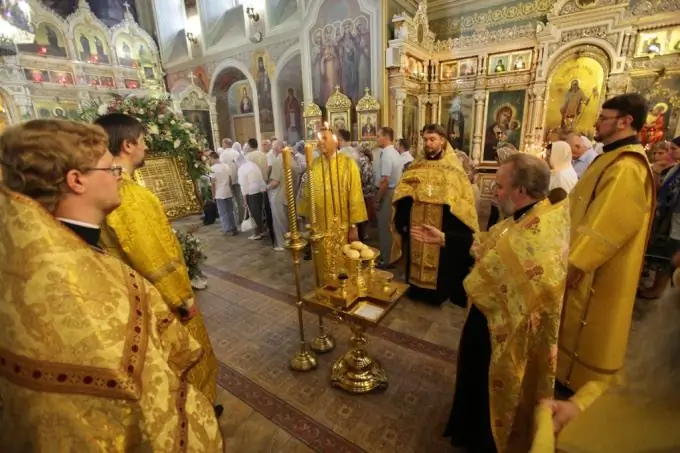- Author Antonio Harrison [email protected].
- Public 2023-12-16 07:44.
- Last modified 2025-01-22 21:44.
In the Christian liturgical charter, there are many different rites that have ancient historical roots. One such sequence is lithium.

It is necessary to clarify that in the Orthodox divine service, lithium is understood as the consecration of bread at the end of the festive vespers at an all-night vigil, as well as a short rite of commemoration of the departed.
The first version of the litia (consecration of bread at Vespers) is currently performed in Orthodox churches during the solemn service of Vespers on the Great Twelve Great Feasts, the Days of Remembrance of the Revered Saints, and the Patronal Feast. This rite is the singing of certain stichera in chorus, as well as several special petitions of the clergy for the people. After that, bread is blessed, as well as pre-prepared wine, vegetable oil (oil) and wheat. Bread, wine, oil and wheat are carried out on a special litany in the middle of the church, where the consecration takes place. During the anointing of the faithful with oil during the evening service, the consecrated bread, wheat and wine are distributed to the faithful. In ancient church practice (the first centuries of the formation of the liturgical charter of the Christian Church), lithium was performed in monasteries during each evening service. The consecrated bread, butter, wheat and wine were the food of the monks.
The second type of lithium is the funeral lithium. It is a short abbreviated rite of the requiem. The funeral lithium consists of the 90th psalm, as well as several funeral troparia, a kontakion and an ikos. It is customary to sing the funeral litiya by the laity in cemeteries. Also, this litiya can be read (sung) at home in memory of the deceased person, especially on the days of the memory of the deceased and the anniversary. In the rite of the funeral litiya, the forgiveness of the sins of the deceased is asked from God.

